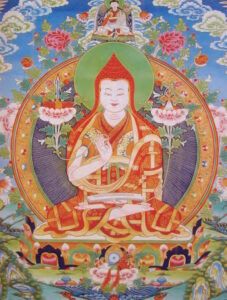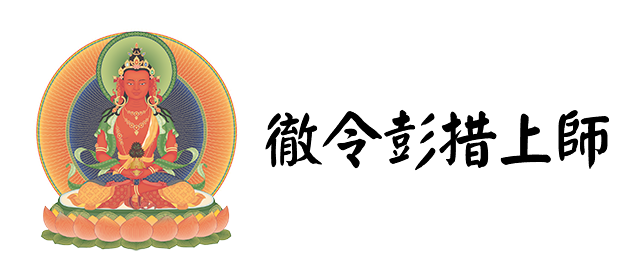
Patrul Rinpoche’s Advice on the Key Points of Dharma Practice,
Explained by Lama Tsering Phuntsok.
This passage was spoken by Patrul Rinpoche, and it’s excellent, so I will translate it for you!
For the Gyalrong people, Garwang and others, who know little but have faith, here are some key instructions on how to practice Dharma.
The place Gyalrong is now called Ngawa Prefecture. A Tibetan named Garwang from Gyalrong went to see Patrul Rinpoche along with some friends. Patrul Rinpoche gave the following teaching.
Why are there people who wish to learn Dharma, but fail to practice it according to its teachings? The reason is that they haven’t made a firm resolution within their hearts, so they are unsuccessful.
Everyone says they want to learn Dharma but are unable to practice it diligently. They come up with all sorts of excuses, staying stuck in the phase of just thinking about it, but when it comes to action, it’s a different story.
Why is your thinking opposite to your actions? It’s because you haven’t made a firm decision yet and don’t really want to learn!
You’re all just half-heartedly learning without any real basis or commitment. You just learn it casually with a frivolous mentality.
Or perhaps it’s because the Dharma is so precious, and the master is so remarkable, so you feel it would be a pity to miss out on the master’s teachings.
However, what is the real reason for feeling you will miss out? It’s just because your friends said so, your Dharma brothers and sisters mentioned it, or you read about it in a magazine.
Therefore, you don’t have that much of a motivation to learn Dharma, and you haven’t made a deep resolution to learn it.
You stroll into the teachings with a naive smile because, well, whatever, the weather’s fine, there’s no rain, you just happen to have time, or you get off work early.
Your motivation for learning the Dharma is nothing more than this. Moreover, you attend the lectures like you’re doing a big favour for your guru, as though 75% of you people come to listen to the lectures for the master’s benefit, not for your own.
With this kind of attitude, you’ll always only study at the superficial level.
So why can’t you further continue your practice? It’s because you never made a firm commitment to learn the Dharma from the beginning. You haven’t actually been shook!
It’s like complaining “Oh! I don’t feel like working anymore,” after working just a few short days because you are not under any real financial pressure, or in the case of starting a business, you say “Ayo! This is too much hassle! I quit!” You just keep going back and forth like this.
This is all because you haven’t really felt the pressure yet.
If you were really strapped for cash, scared, and had no way, then there is nothing you can do but to just continue working hard.
No matter how low the salary, how shitty your boss is, or how anal your coworkers are, you’d grit your teeth and keep working.
It’s true! You haven’t been truly shook by the afflictions and suffering of samsara!
It will be different when you have.
Right now, you are not so desperate for money, but you also feel bored if you don’t go to work, so you still go to work.
You are always so sloppy in everything you learn, which means you haven’t been cornered and that’s why Patrul Rinpoche said this.
Having met your good Dharma teacher, don’t believe other people’s words except the teacher’s. You must act so, like a madman, not being able to listen to what others say.
For example, if Awen is really in urgent need of cash, even if someone says, “Awen, don’t take this job! It doesn’t pay well.” He will say “Hey! I don’t care what you say. I still got to make money.” Awen would act like he’s gone crazy, and no one could stop him.
At this point, you can’t even be wondering whether it’s worth it getting yourself so tired out; you must simply keep fighting. Therefore, practicing Dharma requires this kind of shock.
Only when you encounter this kind of situation can your determination truly arise to practice Dharma.
If your home is comfortable, you have enough to eat, you don’t have any financial pressure, your wife is simple-minded and never gets suspicious, and your kids aren’t rebellious, then you begin to wander around and think maybe you should learn some Dharma and see how it goes. You can’t learn the Dharma with this sort of casual attitude, nor can you attain Buddhahood this way.
In the beginning, tame your mindstream through the four preliminary practices (ngondro) and the four mind-changers.
Afterwards, realize that all activities in samsara and all mental states, such as those of joy and pain, are utterly meaningless, like a patient with gallbladder disease feeling disgusted with greasy food.
Only by thoroughly seeing through the mundane life can we practice Dharma seriously.
It’s hard to say your Dharma practice is truly serious until you see through the mundane life.
Therefore, Patrul Rinpoche said bluntly, “like a patient with gallbladder disease feeling disgusted with greasy food.” This is an analogy that Rinpoche used.
For example, if you were wasted drunk last night, when you woke up this morning, you would feel nauseous and sick just by hearing the name of the liquor, let alone drinking it! You would say “Ugh! Stop talking about it.” Even drinking water or liquids would make you vomit.
Only when we have this kind of disgust toward all the things in samsara can we truly learn the Dharma.
Without such a degree of shock, it is impossible to learn the Dharma well.
Without such renunciation, if you only feel an incidental impulse to renounce the world and hastily abandon worldly life, no longer engaging in your worldly responsibilities, in the end, it will be like a yak squeezing through a window — its head may go through, but its body remains trapped; this is a fruitless endeavor.
Before making a ruthless determination, don’t boast by telling everywhere, “Oh, I’m leaving my family and going to become a monk/nun!” In the end, you give up your robes only a few days later.
You act like a practitioner today and an ordinary person tomorrow, be a saint tomorrow and return to be a mortal the day after tomorrow. This kind of person is useless!
In today’s terms, just think through it clearly before becoming a monk/nun!
You all said, “I’m here to learn the Dharma from Master”, and I often replied, “Think it through carefully before you come here.”
Masters shouldn’t accept disciples immediately, and disciples shouldn’t just kneel down right away. Don’t do this!
Consider it thoroughly before learning. This is what Patrul Rinpoche meant.
Also, there may be some senior practitioners having regressions in their motivation and meditation, maintaining an attachment to worldly life.
Therefore, you must contemplate the preliminary four mind changers until they completely integrate into the depths of your heart.
Before your mind is able to let go, you should not speak Dharma rashly or act rashly, and most importantly, do not abandon your family and children hastily.
If you haven’t thought it through, you might quietly sneak into a monastery in the middle of the night and become a monk/nun, only to leave three months later because your enthusiasm fades. Don’t do this!
Or, when you first join the monastery, the whole world knows that you have become a monk/nun, but when you want to give up your vows, you sneak back home awkwardly and quietly like a thief. Don’t do this either!
You must think clearly before becoming a monk/nun! Think through before practicing Dharma! Think clearly before committing to a master! Think through it before receiving empowerment!
Don’t mess around like that! It’s as though when you’re hungry, you just eat all the food you find at home, regardless of whether it’s expired or not.
This passage means that you should not mess around like this when it comes to learning Dharma.
Once renunciation arises in your heart, making you tired of samsara, giving you unwavering devotion in Dharma, and giving rise to self-confidence like the shameless vajra, only then, can you formally separate from enemies and loved ones, abandon farming, and decisively leave all unfinished business behind.
“Shameless Vajra” is a term from the Kadampa tradition, which means you completely ignore worldly opinions.
Give up everything and make a ruthless determination to practice Dharma, even if it brings shame to your family.
Many people say: “If I become a monk/nun to practice Dharma, will my family feel ashamed……?” None of that matters! Let go of everything. No one can persuade you. Just practice Dharma like this.
Patrul Rinpoche became very famous in his later years. At that time, many monasteries in Tibet said, “Patrul Rinpoche is so eloquent!”
When he spoke casually, everyone said, “Ayo! Samsara is so miserable!” His teachings sparked waves of enthusiasm, and many sought ordination under him.
When he told jokes, everyone laughed; when he spoke of sorrow, everyone cried. He was very talented, but this caused him trouble. Everyone asked him to accept them as monastic disciples. They kept bothering him, so he said, “Stop getting ordinated, stop following me!”
Therefore, this passage means that you must think through carefully before becoming a monk/nun. This is especially important for Chinese practitioners.
You must disregard the tethers of affection with relatives, friends, and spouses, and ignore the advice of elders and close friends to firmly resolve by yourself.
Once you’ve truly decided to practice Dharma and become a disciple, no one should be able to dissuade or stop you. Then it would be OK.
Don’t be swayed by a little discouragement. Don’t disappear into thin air when hearing someone say, “This master is just so-so. His reputation is not very good!” Don’t do this! See clearly!
After you decide to learn Dharma, no one can persuade you and you should be like a madman obsessed with it.
Therefore, after becoming a disciple, you should follow your master with obsession. Be obsessed until the end. Be obsessed life after life!
For me, wherever my master is reincarnated, that is where I hope to be reincarnated. If he descends into hell, I will also follow him to hell unconditionally.
If he ascends to heaven, of course, there is nothing to say, I’ll follow him there. Even if I hear that he is in hell, I’ll also be willing to go there. This is what it means to be obsessed until the end!
Just bet on it! That’s what betting is. It means don’t be like some people who have such fragile faith!
You must be like a bull with its nose rope wrapped around its own neck, uncontrolled by others, or like a wild horse broken free from its reins, never looking back. It must be done to such an extent.
If a puppy is led by a leash, it can’t roam freely, right? If the leash is not in the owner’s hands, the dog can go wherever it wants. It means don’t be tied down.
Or it is like a wild horse running off the reins. The wild horse is restricted by the reins. If the reins are loose, the horse won’t linger; it will cross several mountains within minutes. This is what this paragraph means.
In the main part of practice, the body and speech are servants, and what you do with them is of little use; the mind is the master, and your cultivation of it will make a big difference.
“The body and speech are servants.” Just sitting in a good posture and chanting mantras with your mouth don’t really do much. The most important thing is the mind. The mind is the master. However the mind commands, the body and speech will follow.
Therefore, even if the body and speech are engaged in Dharma practice, if Dharma is not in the mind, mind and speech are still inconsistent and the endeavor is futile.
In Dharma practice, taking refuge and generating bodhicitta are the roots.
Without the roots, the tree of discipline cannot grow; without the tree, the flowers of view and meditation cannot bloom.
Without refuge and bodhicitta, Dharma practice is like a tree without roots.
Without roots, a tree cannot grow; without growth, there will be no flowers; without flowers, there will be no fruits. Each step is interlocked.
Buddhist disciples today often don’t know about the foundational steps nor want these fundamentals. They just want to pick fruits and eat them. Don’t be like that with your Dharma practice!
If you can understand this, you should exert great efforts in practice after receiving the empowerments.
If not, then just recite the Six-Syllable Mantra with kindness in your heart on the basis of refuge and bodhicitta will be fine.
Following a good spiritual teacher means you need a master.
There are so many sadhanas for the generation and completion stages. If you don’t understand them, it’s OK. Just have kindness in your hearts on the basis of refuge and bodhicitta.
Having kindness in your heart means feeling joyful when you see someone happy, and anxiously worrying for others when you see them suffer.
Don’t be feeling sour inside when you see someone happy, or a sense of glee when you see someone suffer Don’t be like that!
Some disciples say, “Aya! Master, I haven’t done anything bad!” Although you haven’t done anything bad, you sure think a lot and give rise to a lot of wrong views. That’s not so good either! This creates a lot of negative karma too.
Therefore, have kindness in your heart and recite “Om Mani Padme Hum, Om Mani Padme Hum…” Don’t worry! Avalokiteshvara will definitely be there to guide you at the end of life.
To sum up, Dharma practice requires diligence and dedication, even putting aside your own life.
Otherwise, even if you know the teachings of the nine vehicles, you won’t attain Buddhahood.
Nowadays, people prefer discussing theory and reason, but if you spend too much effort on theory, it will cause great obstacles in practice.
What is theory? It’s nothing more than knowing a lot and doubting a lot.
For instance: “Why is everything emptiness? If everything is emptiness, why can I see young and old people? If I can see them, why is everything said to be emptiness?” And so on, asking endless “whys”—that’s theory.
The Buddha said all phenomena are emptiness — then they just are! There’s no “why”. It’s just emptiness! That’s all. This is sensibility.
If you ask why it is emptiness, after the reason is explained, another doubt will arise. This is called theory.
Nowadays, this situation is not only in Taiwan but also all over the world.
There are 4 occupations in ancient China, which are scholars, farmers, artisans, and merchants. The intellectuals are classified as scholars, which hold the first status in society!
However, from the perspective of Dharma practice, intellectualism may mislead a lot of people and keep them from developing faith.
The biggest obstacle to faith is rationality. If there is rationality, there will be no faith. If there is faith, there will be no rationality.
Nowadays, many people are overly attached to rationality, so they are never able to settle down and calm down emotionally. They are victims of their rationalities.
The path of the Nine Vehicles is the perspective of Tibetan Buddhism, while in Han Buddhism, there are Eight Mahayana Schools: Zen, Pure Land, Vinaya, Tantra, Tiantai, Huayan, Three-Treatise, and Vijnanavada.
Will knowing the doctrines of these 8 schools back to front and being able to talk the talk reduce your greed, anger, and ignorance? Will your greed, anger and ignorance reduce if you memorize the entire Avatamsaka Sutra? Not necessarily!
Therefore, knowing a lot doesn’t mean you are a good practitioner. Patrul Rinpoche’s point here is that knowing less and doing more means practicing well.
However, anyone who has heard the name of the Three Jewels can attain Buddhahood in the future.
All of the above must be known in detail.
The Buddhadharma has great great merits. Just hearing the name “Three Jewels” will cause someone to attain Buddhahood one day!
This is because one will eventually want to learn the Dharma and attain Buddhahood one day after having been through hell many times, which means of course this isn’t something special!
Lama Tsering Phuntsok
Recorded by Disciple Fenglong, Yeshe Yao
2012/06/01
Chinese version 如何尋找善知識

